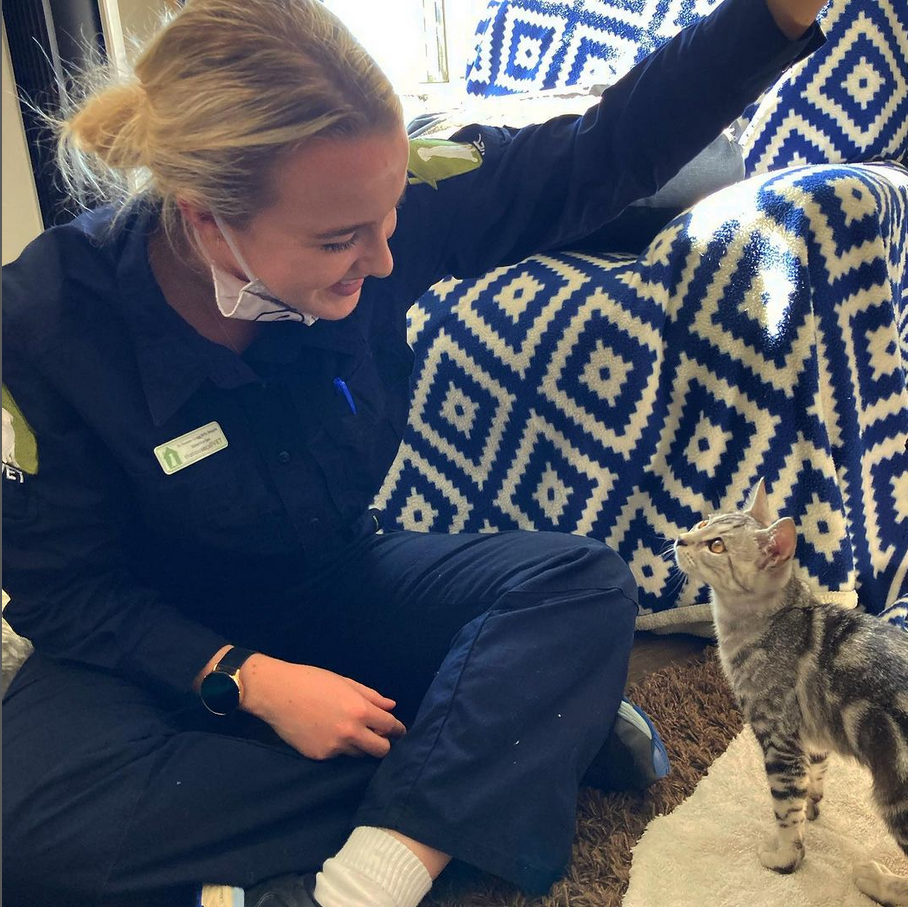Despite our best efforts, our beloved pets can often face a number of health challenges that extend beyond routine check-ups and vaccinations. One such aspect that can go unnoticed is the potential for our pets to experience respiratory conditions, specifically asthma.
While our companions do not suffer from asthma as we know it, they can develop similar symptoms that affects the airways. In this post, we will explore what you need to know about pet asthma and debunk some common myths surrounding it. We will delve into what pet asthma is, the symptoms to look out for in both cats and dogs, as well as the available treatment options and some tips on how to best manage and prevent asthma attacks in your pets.

What is Asthma?
Pet asthma, also known as bronchial asthma, is a chronic respiratory condition that affects the airways of both cats and dogs. It is characterised by inflammation and narrowing of the air passages, making it difficult for pets to breathe properly.
The exact cause of pet asthma is not fully understood, but there are several factors that can contribute to its development. Allergens, such as pollen, dust mites, and mould spores, are common triggers for asthma in pets. Environmental factors, such as cigarette smoke and air pollution, can also play a role. Additionally, stress and anxiety can exacerbate asthma symptoms in pets. It is important to identify and minimize these triggers to help manage and prevent asthma attacks in your furry friends.
While it is incurable, pet asthma is manageable with the right can and medication, allowing your companions to live full, happy and active lives.
Read More: Paws and Pollen: Managing Springtime Allergies in Pets

Can Pets Really Get Asthma? Signs & Symptoms To Look Out For
Yes! Pets can and do develop asthma. While it is a condition that is more commonly seen in cats, our canine companions are not immune to this respiratory condition. It is important to note that pet asthma is not contagious and cannot be transmitted from one animal to another.
Some people mistakenly believe that pets cannot develop asthma because they are not exposed to the same environmental factors as humans. However, pets can be exposed to similar allergens such as pollen, dust mites, mould, and cigarette smoke, which can trigger asthma attacks and respiratory distress.
Understanding that pets can develop asthma opens the door to a more attentive and informed approach to their health. That is why it is essential for pet owners to recognise the signs and symptoms that may indicate respiratory distress in our companions.
Signs of Asthma in Cats
- Frequent Coughing: Persistent coughing, especially after exertion or excitement.
- Wheezing or Laboured Breathing: Audible wheezing sounds, difficulty breathing or open mouthed breathing.
- Lethargy: Unexplained tiredness, lack of energy or overall weakness.
- Reduced Appetite: A sudden decrease in interest or willingness to eat.
Signs of Asthma in Dogs
- Coughing Fits: Repeated or persistent coughing spells.
- Shortness of Breath: Wheezing, rapid or laboured breathing. Heavy panting with open mouth, noticeable even at rest.
- Reluctance to Exercise: Hesitation or avoidance of physical activities.
- Blue or Pale Gums: Indicates severe respiratory distress and requires immediate attention.

Diagnosing Pet Asthma
Diagnosing pet asthma can be challenging, as the symptoms are also present in other respiratory conditions. Your vet will conduct a thorough physical examination and may recommend further tests such as bloodwork, chest x-rays, and more to rule out other possible causes.
One common diagnostic tool is a bronchial lavage, where a small amount of saline solution is flushed into the airways and then collected for analysis. This can help determine if there is inflammation, which can indicate whether or not they have asthma. An accurate diagnosis is crucial for effective treatment and management of your pet’s asthma.
Managing Pet Asthma At Home
In addition to medication, there are a number of steps you can take to help manage your pet’s asthma at home. This allows you to create an environment that minimises potential triggers.
- Maintain a Clean Environment: Regular Vacuuming and Dusting will minimise airborne allergens. Similarly, washing your pet’s bedding regularly helps eliminate accumulated allergens such as dirt and dust.
- Utilize Air Purifiers: These devices can efficiently filter out particles that may exacerbate asthma symptoms in pets (as well as humans!)
- Ensure Good Ventilation: Open Windows for Fresh Air! Adequate ventilation helps improve air quality, reducing the concentration of potential triggers.
- Create a Smoke-Free Zone: Much like humans, second hand smoke can be detrimental to pets with asthma. Designating smoke-free areas will protect their respiratory health.
- Stress Reduction Techniques: If your pet suffers with anxiety and related respiratory issues, it is best to try and minimize loud noises and create a space where your pet can relax. Additionally, familiar toys or blankets can provide a sense of security, reducing stress.
- Managing weight and diet: Maintaining a healthy weight is crucial for pets with asthma, as excess weight can exacerbate respiratory difficulties. While difficult, avoid overfeeding and adhere to recommended portion sizes. Additionally, incorporate light but regular exercise into your pet’s routine.
*Before implementing any dietary changes, consult with your veterinarian to determine the appropriate weight range for your pet’s breed and size.
Preventing asthma triggers for pets is an ongoing effort. Regular veterinary check-ups are essential to monitor your pet’s respiratory health and adjust treatment plans if necessary. Keep an eye out for any changes in your pet’s behaviour or breathing patterns and seek veterinary attention promptly if any concerns arise. With proper management and preventive measures, you can help your furry friend live a comfortable and asthma-free life.

Understanding Pet Asthma Together
Asthma is not just limited to humans; our beloved pets can also suffer from this respiratory condition. By understanding the facts, we empower ourselves as caretakers to provide the best possible care for our furry companions. Recognising the symptoms, identifying triggers, and seeking veterinary attention are crucial steps in managing and preventing asthma attacks in pets. With the right treatment and preventive measures, we can ensure that our pets breathe easy and live a happy and healthy life!
If you find yourself uncertain about whether your dog or cat is experiencing asthma symptoms, The House Call Vet is here to help! Our dedicated team of veterinary professionals specialises in compassionate care for pets at our Brisbane clinics as well as at home. Together, let’s ensure that every breath your pet takes is one filled with ease and comfort. Get in touch today to learn more!

